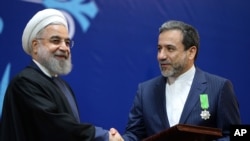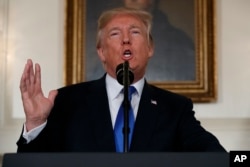The United Nations atomic agency has concluded that Iran is continuing to restrict its nuclear program in compliance with the 2015 international accord aimed at curbing Tehran’s nuclear weapons development.
A quarterly International Atomic Energy Agency report Thursday said Iran is honoring key aspects of the deal that the United States, China, Russia, France, Germany, Britain and the European Union reached with Iran in exchange for the lifting of sanctions that hobbled the Islamic Republic’s economy.
U.S. President Donald Trump has criticized what he says are “disastrous flaws” in the agreement. He has pushed the countries that agreed to the Iran pact to overhaul it, but they have rebuffed him and have continued to support the agreement. Trump has threatened to pull the U.S. out of the agreement and has a May deadline to again consider whether he will waive reimposition of sanctions against Tehran.
Iran Deputy Foreign Minister Abbas Araghchi contended Thursday in a London speech that Trump’s frequent complaints about the deal represent a violation of the terms of the accord and have hurt his country’s ability to secure new foreign investment money. He threatened that Iran could pull out of the deal no matter whether Trump again forgoes new sanctions against Iran.
“If the same policy of confusion and uncertainties about the (deal) continues, if companies and banks are not working with Iran, we cannot remain in a deal that has no benefit for us,” Araghchi said. “That’s a fact.”
The report said Iran has not exceeded limits on its stocks of low-enriched uranium and heavy water, and did not enrich uranium beyond a limit of 3.67 percent purity required by the agreement.
The deal, long in the negotiating, was aimed at extending the time Iran would need to build a nuclear bomb, if it wanted to, from a few months to roughly a year.
The U.N. agency said that Iran told it in a letter that it had decided “to construct naval nuclear propulsion in (the) future.”
In response, the IAEA requested “further clarifications and amplifications,” adding that if Iran went ahead with its naval nuclear propulsion plans, it would need to supply initial design information. Iran has yet to respond, the report said.






